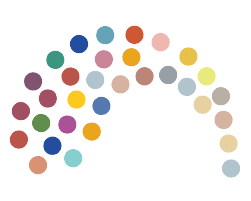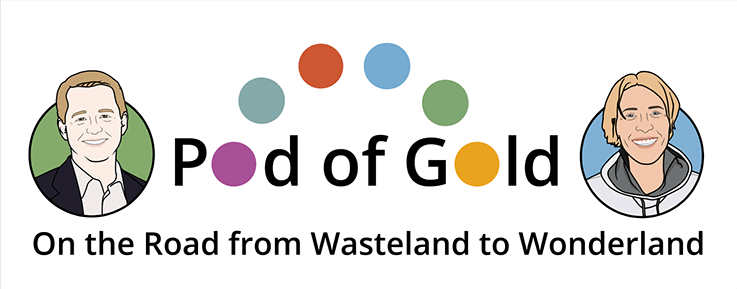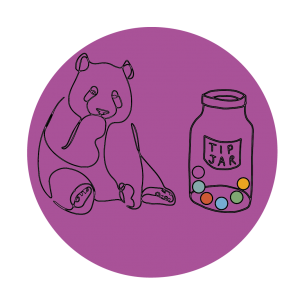We need to support social impact work now more than ever. For the sake of our environment, for our health and wellbeing, we need people working to make a difference. Unfortunately, work for the good of others isn’t always work that pays. How can we sustain social and environmental work in the long term? In this episode, we speak with Kerryn Krige, a specialist in social entrepreneurship, about new economic models for social impact and solidarity.
Posts
Domination and partnership. Our guest this week, Riane Eisler, looks at the history of human society through these two lenses. When in a domination configuration, our familial, economic, and political lives are characterized by conquest, imbalance of power, and abuse. Partnership configurations, on the other hand, emphasize the values of caring, consciousness, and creativity at all levels of society. We got to speak with Riane about what we can do to reorient our systems around the values of empathy and interconnection so that we can survive and thrive in the 21st century.
Care about climate change? Concerned about political polarization? Confused by economics? Let John Barry, professor at the School of History, Anthropology, Philosophy and Politics at Queen’s University Belfast, talk you through his practical approach to achieving a green political economy.
This time, we’re tackling faith. While most of our episodes are about technology, economics, science, or community organizing, these aren’t the only areas people turn to for hope about the future of humanity and the planet. In this episode, we’re talking with Sally Moore and Tina Case, a mother/daughter duo who share the ways that faith colors their lens on power, greed, gratitude, and money.
With the birth of decentralized platforms, like block-chain, we’re seeing new possibilities open up for people, not just in world of crypto-currency, but as a way to securely share data and knowledge of all kinds. In this episode, we’re speaking with Michel Bauwens, a Belgian researcher and founder of the Peer-to-Peer foundation. His work focuses on the capacity of peer-to-peer theory to enable the growth of our knowledge commons and foster a more distributed, equitable, and ecological society.
Industrial agriculture has led to deforestation, land degradation, and biodiversity loss around the world. In this episode, we’re speaking with Festus Kiplagat, an expert in agroforestry and the founder of Green Planet Initiative 2050 in Kenya, who is working to reinstitute indigenous farming practices that can restore the land.
In our relatively short existence as a species, the human race has had a dramatic impact on the Earth. But what if human society could emulate and collaborate with nature rather than trying to dominate it? In this episode, we’re speaking with Dayna Baumeister, a partner at Biomimicry 3.8 and director of the Biomimicry Center at Arizona State University. Dayna’s work is all about how we as humanity can learn from the millions of other species on the planet to improve our lives and live in greater harmony with nature.
When you flush, where does it go? In this episode, we speak with Cheryl Hicks, former Executive Director and CEO of the Toilet Board Coalition. Learn about the untapped value of sanitation and an emerging economy of waste to support our agriculture and energy systems, water preservation, and even our personal health.
Political polarization and misinformation have led to many people to become confused by or completely disengaged from conversations about the climate. Now, Will Hackman is working on a way to address that disengagement. Will is an environmental policy advocate working in Washington D.C. who has dubbed himself the Climate Explainer. Through his advocacy (and a new book he’s writing), Will is connecting people to their personal stake in protecting our planet with the hope that more widespread support will lead to the policy outcomes we need to decarbonize our economy.
Is it possible to build a world economy that actually stops climate change? In this episode, we get to hear from Dr. Barbara Buchner, executive director of Climate Finance at the Climate Policy Initiative. Barbara believes whole-heartedly that we can solve climate change, address economic disparity, and prosper like never before.
Economics touches all of our lives. Shouldn’t it be easy to understand? Turns out, it’s mostly common sense. You just need the right person to explain it to you. And that person is Howard Yaruss. Howard Yaruss is an adjunct professor of economics who’s written a book called Understandable Economics: Because You Can’t Improve a System You Don’t Understand. In this episode, we ask him to dispel some common misconceptions about economics and explain why it’s so important for all people to have a solid understanding of this field of knowledge.
Monopoly is one of the world’s most popular board games. But who invented it? And why? Tom Forsyth, a game aficionado and special expert on the game Monopoly, reveals the unexpected background of the world’s most popular money game and its unique influence on our lives.
How can we tackle both climate change and income inequality? Stephen DeMeulenaere thinks economic redesign through complimentary currencies could be the answer. Complimentary currencies introduce new paths of exchange that can support community resilience, encourage sustainable behavior, and decentralize wealth. Stephen explains why a diversity of currencies–some as complex as Bitcoin, others as simple as a babysitting circle–is essential for a resilient and equitable future.
Joseph Bonasia and Gary Robbins have a unique approach to protecting our environment: they are working to secure legal rights for rivers and other bodies of water in Florida. Securing the “rights of nature” would give citizens and municipalities the authority to sue polluters on behalf of natural resources and the people who share them. Joe and Gary emphasize that as humans, we are not separate from nature, but an interdependent part of global ecosystems. They want our legal system to reflect that interdependence.
Chuck Collins, a program director at the Institute for Policy Studies and co-editor of inequality.org, shares the story of waking up to his own privilege and the racist systems that granted his family generational wealth while stripping it from others. Since that discovery, Chuck has dedicated his life to spreading awareness about wealth inequality and working toward a more equitable economic system. If we’re going to mend the damage done by the ‘extraction economy’, we must first tell the true story of how we got to where we are.
Pod of Gold host, Mel Wymore, takes us through 30 years of community activism in New York City that led him to an important realization about making a more lasting impact: tackling societal structures, especially our money system.
Worried about climate chaos, inequality, and conflict? Podcast hosts, Mel Wymore and Stefanie Overbeck, want to introduce you to the people out there who are making a difference.




